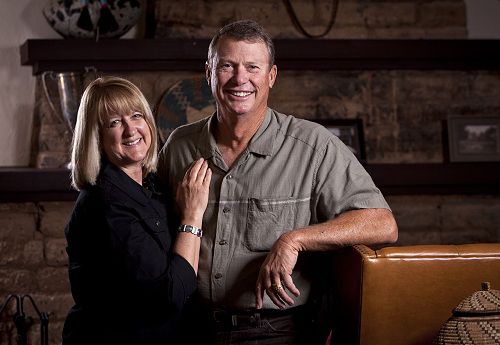Retail Farmer Mark Freeman Talks about Arizona Agriculture
Published
4/15/2013
Mark Freeman comes from a long-time, Arizona farm family and recently retired from the Mesa Fire Dept. where, among many accomplishments, he was their public information officer. He was Arizona State Firefighter of the Year in 1994.

One of our “retail,” direct-market farmers, Freeman has operated The Corn Patch, growing and selling sweet corn and other vegetables at Brown and Center in Mesa for many years. He’ll be open for the season this year in just a few weeks.
Freeman shared several great points about agriculture, along with Dairyman Boyle and another retail farmer Evans, in Maricopa County at the Farm-City Partnership Breakfast April 2nd. The Farm-City breakfast was hosted by Harper’s Nursery in Mesa, Arizona.
- You may have noticed the “Locavore” movement where people want food produced locally that is freshly harvested.
- That’s good for me because I sell locally grown produce, especially sweet corn.
Also a number of people demand that all their food be produced in an organic system.- Agriculture welcomes farmers of all sizes and farming methods.
- We like to see people growing some of their own food in their
back yards . That helps them understand the effort and expense of food production. - But if you have visited certain restaurants or read certain magazine or Internet articles you may have gotten the impression that the ONLY food that tastes good or is safe to eat comes from these small, direct market farms.
- We just ask that you consider some facts:
- Agriculture is a business. Farming without a financial motive is gardening.
- Because profit margins in agriculture have gotten smaller and smaller over the years many farmers have had to grow the size of their farms.
- But even if you see a farm of 7,000 acres in Maricopa County and throughout
America it’s still a family farm. - These will be multi-generational farm families
- Perhaps they incorporated for tax or estate succession reasons but still
family farm. - Farmers of all sizes are serious about growing healthful, safe food.
- All farmers have to use pesticides and chemicals of one kind or another to combat insects, weeds, diseases, fungus.
- Organic farmers use “natural” pesticides instead of what
are called “synthetic” pesticides. - The new generation of pesticides is targeted to kill just the pest in
question not the beneficial insects that live in the fields or the pollinators we need. - No matter the size of their farms, farmers use pesticides carefully and according to the restrictions on the label. We want to make sure your food is safe to eat.
- You probably use more pesticides in your yard to fight weeds, insects,
disease and fungus than farmers do. That’s what the reports of pesticide use shows! - Much has been said about “factory farms” with the implication that the animals are kept in unsafe, unhealthy, cramped conditions and treated badly.
- Maricopa County has 100,000 dairy cows.
- A 1,000-cow dairy is considered pretty small in Arizona with the average size being 1,600.
- Our dairy farmers invite you to visit and see that our cattle have very large pens with shades,
fans and misters to keep them cool and comfortable in the summer. - The cows have a nutritionist to create just the right mix of hay, silage, green chop – which is freshly chopped alfalfa or corn or sorghum – and grain for a healthy diet.
- Don’t you wish you had a nutritionist to cook all your meals? Your wives would be happy!
- Our country’s farm systems provide food that is affordable. On the average, Americans spend about 10 percent of their disposable income on food.
- When you look at agriculture in Maricopa County it may be large scale or it may be small like mine, but it’s all good. And good for you.
For nearly 25 years, Maricopa County has hosted the Farm-City breakfasts. These breakfasts are designed to invite community leaders from the political, educational and civic arena to connect with Maricopa County’s farmers and ranchers.
While many would contend we have too many meetings, everyone looks forward to this spring series of Farm-City breakfasts. It’s a chance to understand this state’s agriculture and connect with those committed to bettering our state and certainly our